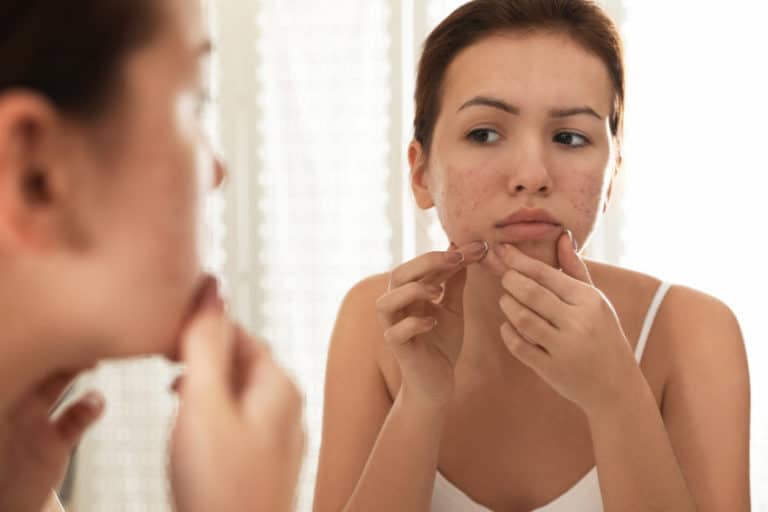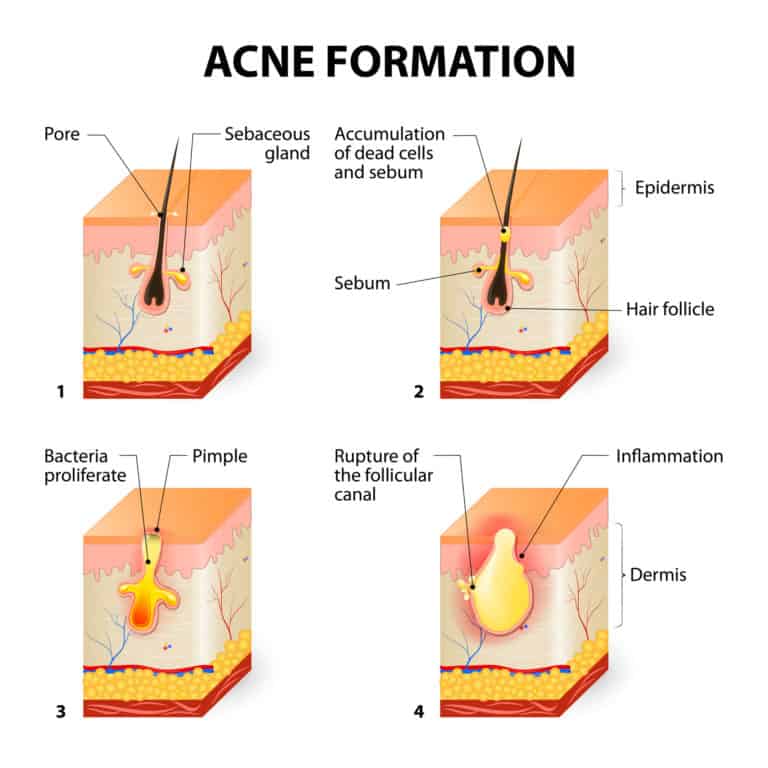How To Get Rid Of Acne Naturally
Are pesky pimples getting you down? Have you squeezed, picked, popped, dabbed, scrubbed, covered, and sighed with frustration and despair one too many times? Do you hope and dream of being blemish-free again? You’re definitely not alone! Read on to learn all you need to know about how to get rid of acne for good!
Acne has long been considered the most common skin disorder to humans and has been reported to affect over 70% of adolescents. While acne is most common in teenagers, it can affect people of all ages and all races. It usually becomes less of a problem after the age of 25 years, although about 15% of women and 5% of men continue to have acne as adults. It may also start in adult life.
Over-the-counter acne treatments are often sought by desperate acne sufferers, however, they can have undesirable effects on the skin, leaving it dry, irritated, weakened, and prone to further problems.
Acne is more than an inconvenience. It can cause both physical and psychological problems including permanent scarring of the skin, poor self-image and low self-esteem and depression and anxiety.
Learning how to get rid of acne naturally is a valuable step for anyone trying to reduce ongoing breakouts of their skin, and restore skin to a healthy, blemish-free state.
What is acne?
Acne is a common skin condition that occurs when pores become blocked with sebum, skin cells, and bacteria. It occurs mainly on the face, chest, upper back, and shoulders – the areas of skin with the most oil (sebaceous) glands. The oil glands (which are connected to hair follicles) release oil that travels up the hair shaft to clean and clear away dead skin cells from the pores, keeping skin clear. However, when the skin’s pores become clogged the excess oil, dead skin cells, and other debris become trapped and build up inside the pores causing whiteheads and blackheads to appear. Acne-causing bacteria feed on the oil and dead skin cells within the pores and as they grow this contributes further to the increased pressure within the pore.
The build-up of pressure within the hair follicle eventually causes it to rupture leaking bacteria, oil, debris under the skin surface and creating an inflammatory response or breakout.
DON’T SQUEEZE!
If you attempt to squeeze a papule or cyst you risk spreading the pus further under the surface of the skin often resulting in more breakouts or infection.

What causes acne?
Whiteheads and blackheads can be caused by many lifestyle triggers. It’s very common among teenagers due to the hormonal changes linked with puberty that cause the sebaceous glands to enlarge and make more sebum. Acne also commonly affects adults and can be triggered by factors such as diet, skincare habits, stress or anxiety, certain medications, an oily skin type, and, in our current Covid world, wearing a mask!
Skin experts agree that you should never strip acne-prone skin of its natural oil or moisture, or you will end up encouraging the skin to produce excess oil, which can result in more congestion and breakouts. Using skin care products that are hydrating and moisturising is a crucial part of reducing breakouts and acne.
If in doubt, chatting with your healthcare professional to understand the cause can help you find the best way to get rid of acne naturally.

How to Get Rid of Acne Naturally
When it comes to treating acne, one of the best things you can do is to establish a good skincare routine with products that support healthy skin function. When your skin is strong and healthy it will be in a better position to heal itself.
Studies have shown that good quality skincare is an integral part of treating acne-prone skin, helping to cleanse, hydrate, protect, repair, and strengthen the skin barrier. Using a good quality, gentle cleanser, toner, and moisturiser is a good start.
Many commercial skincare products are riddled with harmful ingredients, such as parabens, sulfates, and synthetic fragrances, which can leave the skin feeling dry and irritated. Switching to natural, non-irritating products allows you to side-step these negative effects and get the most out of your skincare routine.
Establishing a Good Natural Skincare Routine
1. Cleanser
Daily cleansers are an essential skincare product for treating acne as they help to wash away excess oil, dirt, bacteria, or make-up on the skin’s surface. This helps to prevent the skin’s pores from clogging and leading to further breakouts. Apply the cleanser morning and night, massaging it gently into damp skin before rinsing thoroughly.
For best results, look for a gentle, natural, hydrating cleanser without harsh surfactants. Harsh surfactants can strip your skin of its natural oils and moisture causing your skin to produce more oil to compensate and increasing the chance of more breakouts. Harsh synthetic surfactants to avoid include SLS (sodium lauryl sulphate) or SLES (sodium laureth ether sulfate), and polyethylene glycol (PEG). Natural surfactants can also be irritating to some skin types. Some common natural surfactants include cocamidopropyl betaine, decyl glucoside, lauryl glucoside, and coco-glucoside. If your skin feels tight and shiny after using a cleanser then it is stripping your skin of its natural moisture and you should discontinue use.
Scenturie’s super-gentle Natural Creamy Cleanser effectively removes impurities from the skin without stripping away its natural oils and moisture. Skin is left feeling clean, refreshed, hydrated, and glowing with good health. Suitable for all skin types, including acne-prone skin.
2. Toner
When used correctly a suitable toner can significantly improve your skin health and texture, making it a very valuable addition to your skincare regime. Stay away from toners with alcohol in them as they tend to dry out the skin and can cause irritation to sensitive skin. Look instead for alcohol-free formulations with natural ingredients that hydrate, calm, and moisturise the skin such as hyaluronic acid and aloe vera. Hyaluronic acid is naturally present in human tissues such as skin, ligaments, tendons, and nerves. It acts as a connective tissue ‘organiser’ and helps to hold water. Hyaluronic acid is a valuable hydrating ingredient in skincare formulations helping to balance overactive sebaceous glands from over-producing oil. Aloe Vera Leaf Juice is high in antioxidants, vitamins, and enzymes, and it’s anti-inflammatory and hydrating properties allow it to soothe and moisturise the skin.
A toner should be used 1-2 times daily after cleansing, and before moisturising.
Scenturie’s Replenishing Natural Toner is alcohol-free and features aloe vera leaf juice and plant-based hyaluronic acid, to instantly hydrate, balance, and calm skin. Suitable for all skin types including acne-prone skin.
3. Moisturiser
Moisturisers are a very important element of our skincare as they help to rehydrate, nourish, and strengthen skin. If your skin is prone to acne, avoid thick, heavy moisturisers as they tend to leave an oily layer on the skin which can clog the pores and increase the risk of breakouts. Instead, try using a thin layer of a lighter, non-comedogenic natural moisturiser.
Scenturie’s award-winning Nourishing Natural Day Cream is a super-gentle, non-comedogenic, ultra-hydrating, fragrance-free moisturiser suitable for all skin types.
4. Topical Actives
Retinol & Salicylic Acid
The gold standard of topical acne fighters are retinol and salicylic acid, both found in many over-the-counter creams. Retinol (vitamin A) works to reduce the effects of over-producing oil glands, as well as increasing cell turnover, helping to reduce congestion and oil build-up on the skin’s surface. Retinol also helps improve skin texture by supporting collagen production. However, as great as it all sounds, many people find retinol and salicylic acid too irritating for their skin which can be a big problem if their skin is already irritated from acne.
Bakuchiol
An exciting alternative to retinol is a natural plant-based product called bakuchiol which is showing very promising results in skincare science. Bakuchiol is a natural, less irritating, and vegan alternative to retinol highly valued for its medicinal properties. It has been used in Indian and Chinese traditional medicine to treat a variety of diseases, with positive effects on eczema, rosacea, acne, and other skin conditions. Bakuchiol has excellent antibacterial and anti-inflammatory properties, making it an effective option for eliminating acne-causing bacteria and reducing swelling in acne-prone skin. Bakuchiol also helps to regulate the skin’s natural oil production, which in turn helps to settle acne.
Bakuchiol works to regulate oil production, reduce pore size, reduce fine lines, improve skin texture, and increase skin firmness, resulting in a smoother, healthier-looking complexion.
Bakuchiol may be the natural alternative to retinol your skin needs. Read more about bakuchiol HERE.
Scenturie’s Super Boost Bakuchiol Serum helps to restore optimal skin health, resilience, and a youthful, radiant glow. Suitable for all skin types, including acne-prone skin.
5. Consistency
Consistency is key when it comes to getting rid of acne naturally. For the best outcome, you will need to establish a daily skincare routine and stick to it. If you have trouble remembering your skincare routine, try setting a reminder on your phone.
Along with a healthy diet and lifestyle being consistent with your natural skincare routine is one of the easiest ways you can clear your skin of acne.
Despite their best efforts, a small number of people may end up needing professional help with their acne. If your acne does not improve after 2-3 months of following the above suggestions then see your GP or skin specialist for advice and further treatment options.
For more information on how to care for acne-prone skin click HERE.
References
https://www.ncbi.nlm.nih.gov/pmc/articles/PMC399720/
How To Get Rid Of Acne Naturally Read More »







